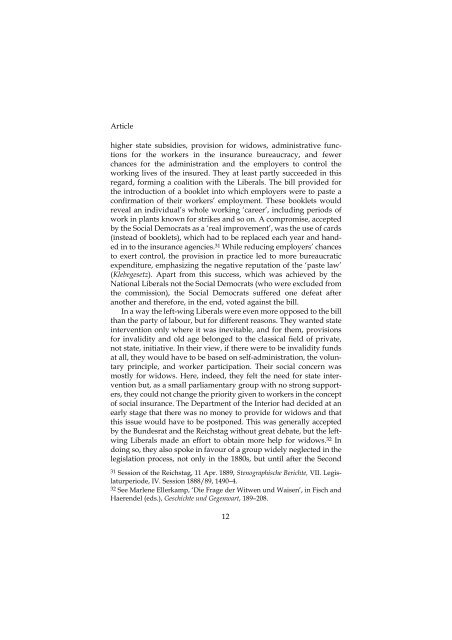Download - German Historical Institute London
Download - German Historical Institute London
Download - German Historical Institute London
Create successful ePaper yourself
Turn your PDF publications into a flip-book with our unique Google optimized e-Paper software.
Article<br />
higher state subsidies, provision for widows, administrative functions<br />
for the workers in the insurance bureaucracy, and fewer<br />
chances for the administration and the employers to control the<br />
working lives of the insured. They at least partly succeeded in this<br />
regard, forming a coalition with the Liberals. The bill provided for<br />
the introduction of a booklet into which employers were to paste a<br />
confirmation of their workers’ employment. These booklets would<br />
reveal an individual’s whole working ‘career’, in cluding periods of<br />
work in plants known for strikes and so on. A com promise, accepted<br />
by the Social Democrats as a ‘real improvement’, was the use of cards<br />
(instead of booklets), which had to be replaced each year and handed<br />
in to the insurance agencies. 31 While reducing employers’ chances<br />
to exert control, the provision in practice led to more bureaucratic<br />
expenditure, emphasizing the negative reputation of the ‘paste law’<br />
(Klebegesetz). Apart from this success, which was achieved by the<br />
National Liberals not the Social Democrats (who were excluded from<br />
the commission), the Social Democrats suffered one defeat after<br />
another and therefore, in the end, voted against the bill.<br />
In a way the left-wing Liberals were even more opposed to the bill<br />
than the party of labour, but for different reasons. They wanted state<br />
intervention only where it was inevitable, and for them, provisions<br />
for invalidity and old age belonged to the classical field of private,<br />
not state, initiative. In their view, if there were to be invalidity funds<br />
at all, they would have to be based on self-administration, the voluntary<br />
principle, and worker participation. Their social concern was<br />
mostly for widows. Here, indeed, they felt the need for state intervention<br />
but, as a small parliamentary group with no strong supporters,<br />
they could not change the priority given to workers in the concept<br />
of social insurance. The Department of the Interior had decided at an<br />
early stage that there was no money to provide for widows and that<br />
this issue would have to be postponed. This was generally accepted<br />
by the Bundesrat and the Reichstag without great debate, but the leftwing<br />
Liberals made an effort to obtain more help for widows. 32 In<br />
doing so, they also spoke in favour of a group widely neglected in the<br />
legislation process, not only in the 1880s, but until after the Second<br />
31 Session of the Reichstag, 11 Apr. 1889, Stenographische Berichte, VII. Legis -<br />
latur periode, IV. Session 1888/89, 1490–4.<br />
32 See Marlene Ellerkamp, ‘Die Frage der Witwen und Waisen’, in Fisch and<br />
Haerendel (eds.), Geschichte und Gegenwart, 189–208.<br />
12













